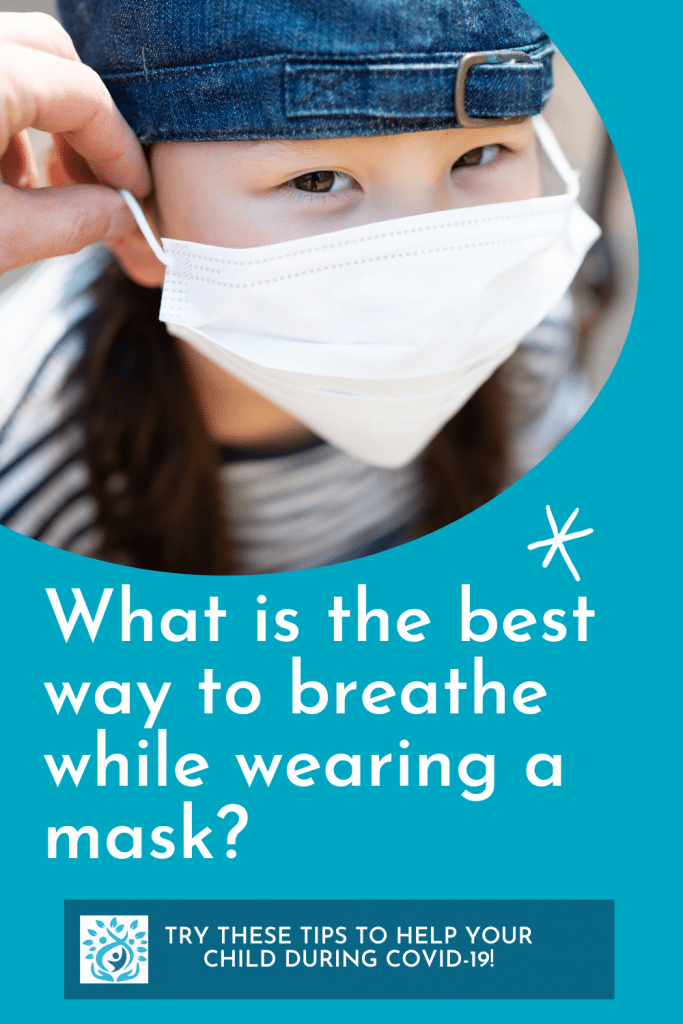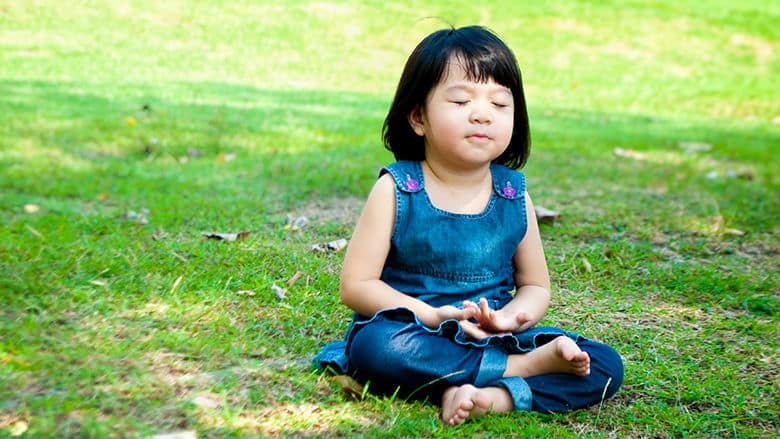Written by: Shira Danino, M.A., CCC-SLP, Edited by: Megan Sliski, PT, DPT

Some of us are finding that we’re spending a lot more time in our masks than we thought we would. I can admit it: in March, I had NO clue that I’d be wearing a mask in April, let alone into February of the next year. From the looks of it, masks are going to be around for quite some time.

The benefits of masks in such an uncertain world are obvious. They protect us and our children, and they protect others from what germs we could possibly be carrying. Wearing a mask is our best defense, along with social distancing and washing our hands well and often. However, what’s not as obvious are the downsides to mask wearing. Aside from the foggy glasses and “maskne,” there are some serious things to look out for and prevent while wearing a mask.
When we are sitting and breathing at rest, the proper position for our mouths is to be closed and our tongues to be resting behind our top front teeth. For some reason, when we wear masks, we are more prone to mouth breathing. I’d like to suggest trying to breathe through your nose as often as possible while wearing a mask.

Here’s why:
- Mouth breathing contributes to dehydration. Ever wonder why you’re so parched under that mask? Yes, one of the reasons is that we drink less often because our mouths are covered and we don’t want to lift it to drink while around other people. But if you’re mouth breathing under there, you are definitely getting more dehydrated than if you were breathing through your nose. Our kids need to be hydrated in order to learn properly. Proper hydration is directly linked to focus and concentration as well as energy levels.
- Mouth breathing can contribute to inflammation of the respiratory system. When we breathe through the mouth (even when wearing a mask) dust particles, bacteria, and viruses can enter straight into the throat and lungs. Our mouth does not have a filtration system to protect us from these germs and particles. We can be more at risk for infection and inflammation if we breathe through our mouths.
- Mouth breathing can compromise your immune system. Our nose is designed to filter the air we breathe and protect our airway. While our nose filters out these bigger particles, it also humidifies and warms the air in preparation for our throat and lungs.
- Mouth breathing may cause structural changes in children. Dr. Soroush Zaghi at The Breathe Institute writes that, “Habitual open-mouth breathing may adversely affect craniofacial development in children which may result in structural changes that directly impact the stability and collapsibility of the upper airway during sleep.”

Next Steps
I think I’ve made my case for nasal breathing, with or without a mask. Try and practice nasal breathing with your kids who are old enough to wear masks. It may not happen right away, but even reminders throughout the day may be helpful. Feel free to share these tips with your child’s teachers, as they’re spending many masked hours with students.
These are useful things to keep in mind even in a “maskless” world. So, if you notice your child breathing with an open mouth on a regular basis, contact our office to get a free screening. Remember, mouth breathing can change the shape of your child’s mouth, so speech therapy can help prevent further consequences.
We hope you stay safe and well during what we hope is the final stretch of this pandemic!
CLICK HERE for an article by Children’s Hospital of Philadelphia for extra education on the importance of nose breathing in children!
Comment below with your questions or share with us how you are helping your child to maintain a nose-breathing pattern while wearing their mask!
Resources:
New York- Presbyterian (2020) https://healthmatters.nyp.org/how-to-breathe-better-with-a-mask
The Breathing Institute (2020) https://www.thebreatheinstitute.com/
¿Cuál es la mejor manera de que mi hijo respire cuando usa una mascarilla?
Algunos de nosotros estamos descubriendo que pasamos mucho más tiempo con nuestras máscaras de lo que pensábamos. Puedo admitirlo: en marzo, NO tenía ni idea de que usaría una máscara en abril, y mucho menos en febrero del próximo año. Por lo que parece, las máscaras estarán disponibles durante bastante tiempo.
Los beneficios de las máscaras en un mundo tan incierto son obvios. Nos protegen a nosotros y a nuestros hijos, y protegen a los demás de los gérmenes que posiblemente podamos portar. Usar una máscara es nuestra mejor defensa, junto con el distanciamiento social y lavarnos las manos bien y con frecuencia. Sin embargo, lo que no es tan obvio son las desventajas de llevar una máscara. Aparte de las gafas empañadas y el “maskne” (acné causado por mascarillas), hay algunas cosas serias a tener en cuenta y prevenir mientras se usa una máscara.
Cuando estamos sentados y respirando en reposo, la posición adecuada para nuestra boca es estar cerrada y nuestra lengua descansando detrás de nuestros dientes frontales superiores. Por alguna razón, cuando usamos máscaras, somos más propensos a respirar por la boca. Me gustaría sugerirle que intente respirar por la nariz con la mayor frecuencia posible mientras usa una máscara.
Este es el por qué:
- Respirar por la boca contribuye a la deshidratación. ¿Alguna vez te preguntaste por qué estás tan sediento debajo de esa máscara? Sí, una de las razones es que bebemos con menos frecuencia porque tenemos la boca tapada y no queremos levantarla para beber mientras estamos con otras personas. Pero si respira por la boca, definitivamente se está deshidratando más que si respirara por la nariz. Nuestros niños necesitan estar hidratados para aprender correctamente.
- La hidratación adecuada está directamente relacionada con el enfoque y la concentración, así como con los niveles de energía.
- La respiración bucal puede contribuir a la inflamación del sistema respiratorio. Cuando respiramos por la boca (incluso cuando usamos una máscara), las partículas de polvo, las bacterias y los virus pueden ingresar directamente a la garganta y los pulmones. Nuestra boca no tiene un sistema de filtración que nos proteja de estos gérmenes y partículas. Podemos tener un mayor riesgo de infección e inflamación si respiramos por la boca.
- Respirar por la boca puede comprometer su sistema inmunológico. Nuestra nariz está diseñada para filtrar el aire que respiramos y proteger nuestras vías respiratorias. Si bien nuestra nariz filtra estas partículas más grandes, también humedece y calienta el aire en preparación para nuestra garganta y pulmones.
- La respiración bucal puede provocar cambios estructurales en los niños. El Dr. Soroush Zaghi en The Breathe Institute escribe que, “La respiración habitual con la boca abierta puede afectar negativamente el desarrollo craneofacial en los niños, lo que puede resultar en cambios estructurales que impactan directamente en la estabilidad y colapso de las vías respiratorias superiores durante el sueño”.
Próximos pasos
Creo que he defendido mi defensa de la respiración nasal, con o sin máscara. Intente practicar la respiración nasal con sus hijos que tengan la edad suficiente para usar máscaras. Puede que no suceda de inmediato, pero incluso los recordatorios a lo largo del día pueden ser útiles. No dude en compartir estos consejos con los maestros de su hijo, ya que pasan muchas horas enmascarados con los estudiantes.
Estas son cosas útiles a tener en cuenta incluso en un mundo “sin máscara”. Por lo tanto, si nota que su hijo respira con la boca abierta con regularidad, comuníquese con nuestra oficina para obtener un examen gratuito. Recuerde, la respiración bucal puede cambiar la forma de la boca de su hijo, por lo que la terapia del habla puede ayudar a prevenir más consecuencias.
¡Esperamos que se mantenga sano y salvo durante lo que esperamos sea el tramo final de esta pandemia!


0 Comments